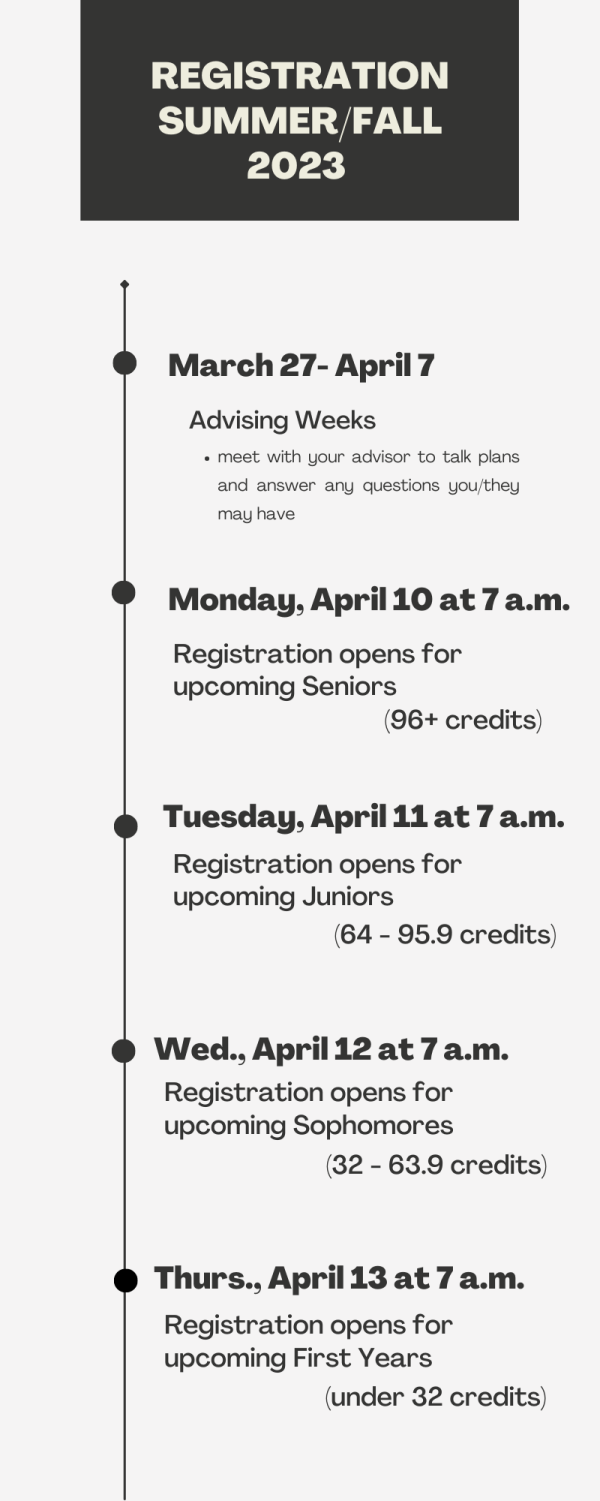Faculty perspective on registration
Hamline faculty prepare for class registration in an ever-changing environment.
March 28, 2023
 Class registration has always been a stressful time for college students. Everyone begins worrying about getting into the classes needed for their major, filling out their Hamline plan requirements and trying not to avoid taking an 8 a.m. The stress starts far before the semester does.
Class registration has always been a stressful time for college students. Everyone begins worrying about getting into the classes needed for their major, filling out their Hamline plan requirements and trying not to avoid taking an 8 a.m. The stress starts far before the semester does.
However, students aren’t the only people who have to prepare for the trials and tribulations of registration. Professors Kristina Deffenbacher and Jamie Spaulding agreed to share their thoughts on the process. Professor Deffenbacher works in the English department, and Professor Spaulding teaches Forensic Sciences.
Upon being asked how her classes have changed since the pandemic, and how attendance has been impacted, Deffenbacher said that it’s important to remember that we have all come out of a traumatic experience. Now, everyone has to figure out new systems that work for them, since the old ones don’t. She wishes to do so in collaboration with her students.
“People with college-age bodies are still in fight-or-flight,” Deffenbacher said .
Spaulding’s classes, meanwhile, tend to fill up quickly, and his students have always been excited to attend. He says that this has remained pretty consistent, as his courses are hands-on and specialized. Since the pandemic, his Survey of Forensic Science course has become hybrid, with flexibility being a priority. He said that he always tries to think about the best class format for students when he teaches. Specifically, he discussed how one can record online lectures and use the videos to study instead of having to search through books for information.
After Hamline broke national news last semester for an incident in an art history class, some faculty members have reflected on their roles in the classroom. Spaulding mentioned that he had been thinking about the classroom incident for a while, as his courses touch on sensitive material frequently. He believes that his job is to elevate the ways his students think and to give them the best experience possible, but he has been considering the material he covers.
The field of forensic science necessitates exposure to the realities of death. This means, of course, that Spaulding’s classes will need to discuss heavy material. He said that warnings are given whenever suicide and sexual assault come up in the materials, but he’s never thought about the topic more than after the incident.
“How do we learn the best way to approach these scenes?” Spaulding said.
Deffenbacher said she loves Hamline — the students, the work of teaching, learning with and from her students. She believes that the student body has changed for the better, and that the issue stems from the university’s structure not keeping up with the changes, and that the structures will evolve.
“I’ve always loved working with students,” she told the Oracle. “That hasn’t changed.”
In addition, Deffenbacher expressed her desire for students to find their way to classes that work for them and that they’re interested in. She noted that advisers are here to help them if need be.
Spaulding is the sole advisor in the Forensic Sciences department, meaning that he has a good number of students to attend to. He hopes that students will get into the classes they need to, but knows it doesn’t always work out. It’s especially difficult for him when seniors get put on waitlists for the courses they need to take in order to graduate. He makes sure students have contingency plans, and prays that he won’t have to do damage control.
“Victory loves preparation, but preparation doesn’t love victory back,” he said.
Professor Deffenbacher plans on teaching First Year Writing and Literary and Cultural Theory in the fall, but also told the Oracle about a new course she has planned. She’ll be teaching Feminist and Queer Theories and Stories, in conjunction with Philosophy professor Steven Kellert’s Philosophical Issues in Gender and Sexuality course. They’ll be pairing their classes, combining the disciplines to ensure students get both philosophical and English views on the issue.
Next fall, Professor Spaulding will be teaching Crime Scene and Death Investigation, Survey of Forensic Science and Professional Issues in Forensic Science.
